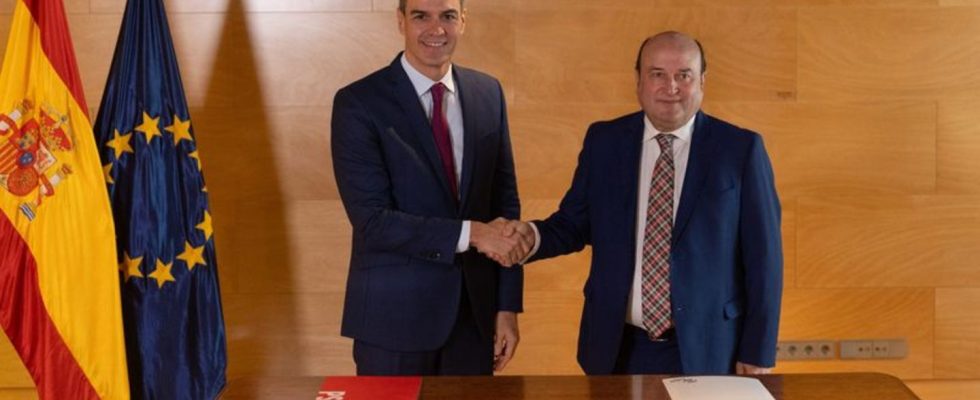After parliamentary elections
Despite government agreements, Spain is facing turbulent times
In all likelihood, Prime Minister will remain: Pedro Sanchez (l.) – and Andoni Ortuzar, PNV President, in the lower house in Madrid. photo
© Eduardo Parra/EUROPA PRESS/dpa
If there are no surprises, the way is clear for a new edition of the left-wing government of Pedro Sánchez in Spain. But calm will probably not return to the fourth largest EU economy.
The renewed triumph of Sánchez, who has ruled Spain for five and a half years – years of pandemics, wars and inflation – could be a Pyrrhic victory, i.e. a success that was bought (too) dearly. Despite the various agreements to form a new government, the country is facing turbulent times.
What is primarily causing indignation, even uproar, is the amnesty that the Socialists have promised to the “Catalanistas” around the separatist leader Carles Puigdemont, who lives in exile in Brussels. A pardon was agreed for all independence supporters prosecuted by the judiciary between 2012 and 2023. So also for those who were involved with the “still” fugitive Puigdemont in the failed attempt to secede in autumn 2017.
Thousands take to the streets
The mood is boiling. For seven nights in a row, thousands have been protesting in front of the headquarters of the Socialist Party (PSOE) in various cities in Spain and also in Brussels, sometimes very violently, against the planned amnesty law, the details of which have not yet been worked out. On Thursday evening, 24 demonstrators were arrested in Madrid alone, and seven police officers were injured in violent clashes. Several PSOE seats were smeared with insults and hate slogans. Also in Brussels, where “Traidores” (traitors) could be read on the facade on Friday.
The majority of participants in these rallies, which have been declared “spontaneous”, are supporters and politicians of the right-wing populist party Vox, who sometimes protest with Hitler salutes and shouts of “Viva Franco” – “Long live (Dictator) Franco”. But opposition leader Alberto Núñez Feijóo’s People’s Party PP has also announced resistance on the streets. She has called for the first nationwide protest on Sunday. Feijóo describes the amnesty plans as an “attack on the rule of law.” Isabel Díaz Ayuso, the very influential head of government in the Madrid region, even speaks of the beginning of a “dictatorship”.
Speculation about a political assassination attempt
The fact that the right-wing Spanish politician and Vox co-founder, 78-year-old Alejo Vidal-Quadras, was shot and seriously injured on the street in Madrid on Thursday caused further excitement. The motive was initially unclear. There was speculation about a political assassination, but the police did not rule out a robbery.
The vote on Sánchez’s candidacy in the lower house of parliament in Madrid, the “Congreso de los Diputados”, is expected to take place next week. There is no date yet. After agreements with the left-wing alliance Sumar, with the two separatist Catalan parties, the liberal Junts and the left-wing ERC, with the PNV and other regional parties of all stripes, Sánchez can rely on 179 of a total of 350 votes – so the absolute majority has appeared since Friday and thus re-election as certain in the first round of voting. Thousands are expected to try to disrupt the Socialists’ party outside the House of Commons. There is fear of an escalation of violence, reported the TV station RTVE.
In the early election on July 23rd, the Socialists only came second behind the conservative People’s Party (PP) led by leading candidate Feijóo. King Felipe VI had therefore initially commissioned Feijóo to form a government. But the 62-year-old’s candidacy was rejected by the lower house at the end of September – partly because Feijóo had flirted heavily with Vox. When it was Sánchez’s turn, very few people were convinced of the chances of success – even within the PSOE.
But the smart socialist, who has long been considered a political survivor because he has often been declared politically dead and has repeatedly been able to overcome resistance within and outside his own party, achieved what the Catalan one did with the agreement with Puigdemont and parties of all stripes The newspaper “La Vanguardia” and other Spanish media were extremely skeptical and described it as “squaring the circle”.

